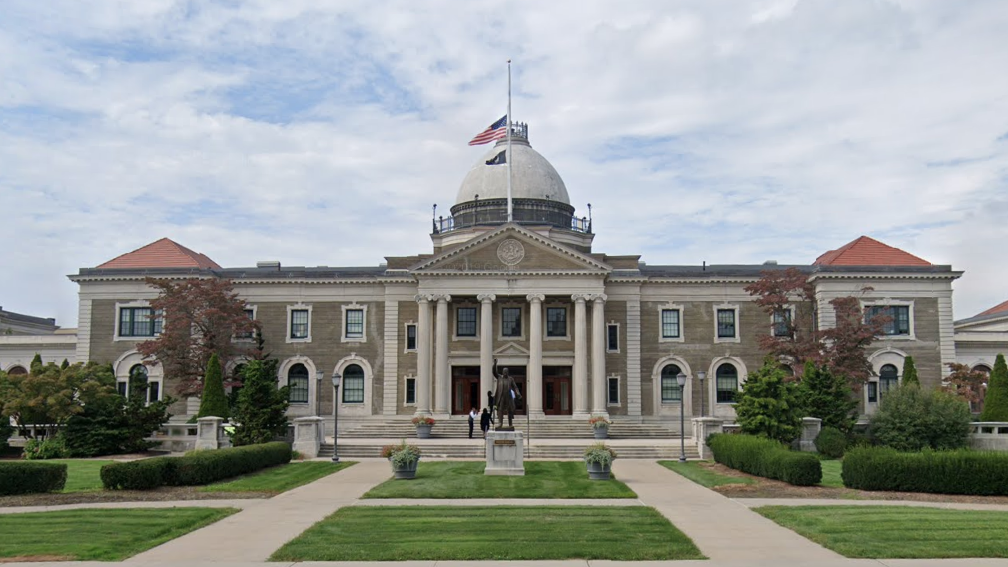The administration of Nassau County Executive Laura Curran on Monday defended a new financial plan to close a $384 million budget shortfall due to the coronavirus pandemic that avoids a state control board refinancing county debt.
The county faces a deficit of $384 million in the 2020 fiscal year and $364 million in the 2021 fiscal year due to the coronavirus pandemic, according to the county’s multiyear financial plan released two weeks ago.
The new strategy announced on Monday avoids additional borrowing by the Nassau Interim Finance Authority in the 2020 fiscal year and will not extend the current date of expiration of the finance authority’s debt or extend the length of its control period over the county, according to county officials.
Nassau’s deputy county executive for finance, Raymond Orlando, and Budget Director Andrew Persich answered questions from the county Legislature’s Budget Committee on Monday, after being subpoenaed on Aug. 3.
The hearing took place in the legislative chamber, where questions regarding how the county could restructure its looming debt were asked by Presiding Officer Richard Nicolello (R-New Hyde Park), committee Chairman Howard Kopel (R-Lawrence), Legislator Ellen Birnbaum (D-Great Neck) and Legislator John Ferretti Jr. (R-Levittown).
Questions were also asked surrounding the dates when tentative plans were sent, and to whom, since the beginning of the pandemic. While several dates of submission were unclear, Orlando said, the Curran administration shares the goals of finding the most efficient and cost-effective ways to quash the county’s debt.
“We share your goal of effectively managing the county’s budget using NIFA in such a way, if possible, to not go beyond its existing existence currently,” Orlando said. “We believe as you do that we should return the ultimate financial decision-making back to the county’s elected officials, the county executive and this Legislature.”
Orlando also expressed concerns regarding the costs of the finance authority’s future involvement restructuring debt but touted the “flexibility” that using the organization would provide to the county in order to remain financially afloat.
Nicolello has expressed concerns over the long-term involvement of the finance authority in overseeing county finances.
“The administration has refused for months to provide us with an analysis of these options, but has instead sought to ram through a refinancing plan that will burden residents with hundreds of millions in debt service and bureaucratic costs through 2051,” Nicolello said.
According to figures provided by Maurice Chalmers, director of Nassau County’s Office of Legislative Budget Review, the average annual increase of the county’s expenses for the Nassau Interim Finance Authority from 2008 to 2019 was 8.7 percent.
If that same average is applied for the next 30 years of Nassau Interim Finance Authority expenses, the county will spend a total of more than $257 million, according to the figures. With no escalation from the county’s 2020 $2 million allocations for expenses, it would be a total of $60 million.
County officials announced last week that programs to close the budget gap have been prepared that rely on the finance authority to refinance $75 million of existing county debt in the fiscal year 2020 and another $210 million next fiscal year.
“In the absence of federal aid, we must forge ahead and strategize for 2021 and beyond, to ensure essential services are protected today and for future generations,” Curran said. “We must work together, as we did through the long spring months of COVID quarantine, to get the County back on our strong financial path leading us out of NIFA’s control.”
The new plan will also allow Nassau to push for and “best utilize” any potential state and local aid the federal government may provide. Curran, a Democrat, has been active in calling on the federal government to push for increased aid to municipalities since the pandemic began.
“While Washington has failed to take real action and support local governments, financially crippled from the impact of COVID-19, I am urging the support of our Legislature on this creative financial plan as it is the best bet to maintain a balanced budget in 2020,” Curran said. “We will not settle for Washington’s failure to negotiate a solution to support devastated counties like Nassau and I am calling on our federal partners to renew their efforts now.”



